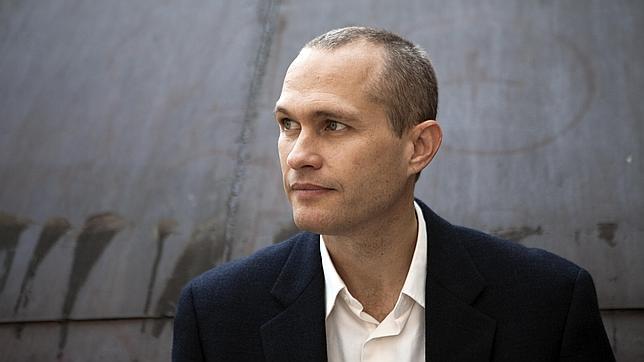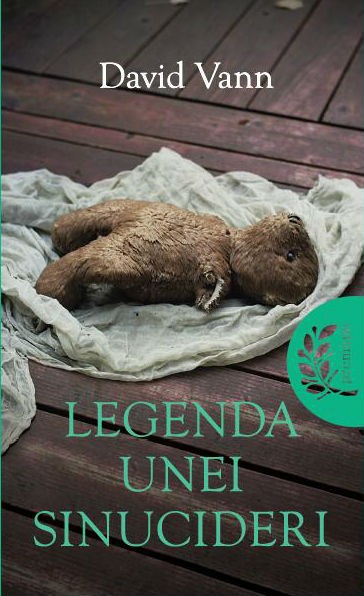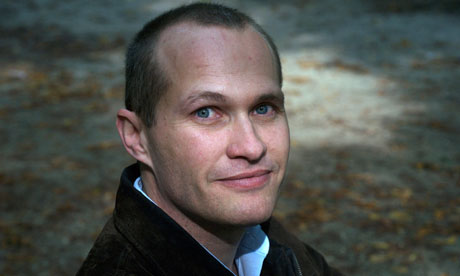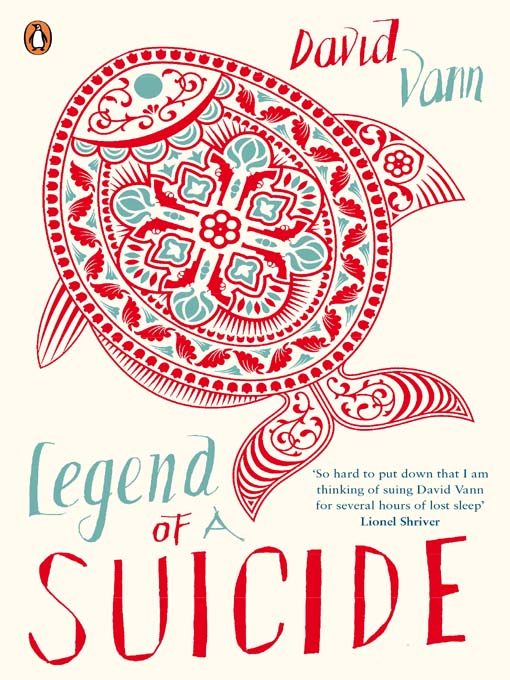
David Vann is an internationally-bestselling writer, whose books (Legend of a Suicide, Caribou Island, Dirt, Goat Mountain, Last Day On Earth: A Portrait of the NIU School Shooter şi A Mile Down: The True Story of a Disastrous Career at Sea) have been translated in twenty languages and have won fifteen prizes, including best foreign novel in France and Spain. He has also written for important magazines, such as Esquire, Men’s Journal, The Sunday Times, The Observer, The Guardian, The Sunday Telegraph, The Financial Times, Elle UK, Writer’s Digest etc., and he is currently a Professor at the University of Warwick in England.
In Romania, Litera Publishing House published, in 2013, his debut novel, Legend of a Suicide, translated by Justina Bandol. In a few words, this is a wonderful book and it deserves to be read immediately.
The American writer was in Iași, Romania, as a guest of the International Literature and Translation Festival. That’s how we got to have an interview with David Vann. We talked about suicide and trauma, violence transmitted through DNA, his books, especially about the Legend of a Suicide, influences and what does it mean to be a bestselling author, movies and women and many, many other things, as you’ll discover below.
Your writing style has been compared to Hemingway’s, Melville’s, Faulkner’s etc. Do you agree with these comparisons?
Of course that it’s always nice if an interviewer or a reviewer is generous enough to compare me with some great writers. I really appreciate that, it’s a gift. The truth is that no writer is original. There is something in my style from all those writers because I read them and they had a big influence on me. I read Hemingway and Faulkner a lot and especially Cormac McCarthy – I think he’s greater that the previous mentioned writers; I also just read again Moby Dick. So, yes, I think that my style has a little bit from each of those and also from the languages that I studied (Latin and old English).
Actually, I am also influenced by some women writers – for example, I am more influenced by Flannery O’Connor, Katherine Anne Porter or Marilynne Robinson than I am by Hemingway or Falkner. Marilynne Robinson’s voice was the one that I heard when I wrote the first short-story from Legend of a suicide; she’s actually the biggest influence for this book. It’s funny that, because I’m a man and the subject of Legend of a suicide is a kind of a tragedy, with guns and wilderness, they always associate me with male writers, but, in fact, I have been more influenced by women writers.
What is it like to be a bestselling author?
Well, in France, it was amazing – there is an independent bookseller in every neighbourhood and all were recommending my book; there was a woman who sold 1300 copies just by herself. And that was incredible to me, such an amazing gift.
Being a bestselling author is not only about the media coverage or the book has taken it by its own way, it’s the hard work of a lot of journalists and booksellers, who were very generous and put a lot of their time into telling people about the book. So I realized it was actually a huge group project, even if I wrote it.
Your first book, Legend of a suicide, was rejected twelve years by the publishers. In all that time, did you ever think that maybe your writing wasn’t good enough?
Oh, yeah, of course I believed that. I had half a dozen agents – in U.S., you don’t have an editor, you have an agent, who has to send your books to an editor, and no agent would send it. They said it was good writing, but it couldn’t be published, no one would buy it, no one would be interested. And I believed what they said and I shouldn’t have, I should have tried more. Finally, I sent it to a contest and it was published just because I won the contest and they had no other choice (laughs).
But, as I said, I believed the agents and I didn’t write anything for six years, I became a captain on a boat. I wish I was a little braver, but I lost heart.
This book was considered a masterpiece. How is it to give your best book from the beginning?
(laughs) Every writer has the feeling that his books improve over time and some people think that your first one is the best one. I think that Goat mountain, the one that just came out, finishes the four books that have my family background and which started in a Legend of a suicide. To me, Goat mountain is the best book because it is the most extreme, craziest, the most out of control and unconscious; and that is because I had no idea what the book was about until the last fifty pages of it. As an experience, that was the one where fireworks really happened. It is the most significant book to me and it links the other ones and finishes them. It is actually written after a draft of the first short-story that I wrote – my first and most important material – and it’s the last one to come out.
Legend of a suicide had my father’s suicide in it, the most important event that happened in my life and it was a distillation of what happened in ten years with my writing. It shows a longer effort. It was the first book where I understood that writing is unconscious – I thought that the father will kill himself in the end, but the boy dies; I didn’t see that coming, it was the first time that I saw there were many things which were not planned in the book. Legend of a suicide is the book that surprised me and all the books after this were written without a plan or an outline and very little edited, published almost as they were in the first draft.
It’s fine with me if the people consider Legend of a suicide my best book, but to me Goat mountain is the one.
Did you feel any pressure when you wrote the next books after Legend of a suicide?
No, because it took so long to get published. I wrote three other books, non-fiction, before my first one was published.
When it appeared, I had a very good review in New York Times. Afterwards, publishers wanted another book. I could have felt pressure then, but I didn’t. I had a wonderful experience of somebody buying my next book even if it wasn’t written yet. And I wrote it everyday for five and a half months.
I know that suicide, for example, is a recurrent theme in your books. Did you cure your trauma through literature?
Yeah, I think writing has been a tremendous therapy, I feel so much better. After finishing Goat mountain, the fourth book about my family, I felt like I was done – not just done with the books or with my family, but done in life. I felt I did everything I wanted to do.
Well, I really hope you are not done yet…
(laughs) No, I’m not. I’ve actually written two other books since then. But that’s what I felt in that moment.
Sure, it was a therapy. I think writing is about truth, but also about beauty – to turn something ugly from the past into something beautiful, redemptive somehow.
Do you believe that violence can be transmitted through DNA?
I do, actually, even if I shouldn’t say that because I don’t think we’re doomed. For twenty-two years I thought I was doomed to repeat my father’s suicide, I felt like I will hit a low point in my life and it will be waiting for me. When I did hit a low point and I lost everything, I realized that I hadn’t had a single thought about suicide. So that terrible time became a happy one, I felt free of this ”legacy”.
I don’t think anyone should feel doomed by their DNA because we can escape our family’s legacy. But, in the same time, I think we don’t entirely know how we are shaped, how we are made, a lot of it it is unconscious. It is possible to be shapen by heritage even if you don’t know about it. It is something there in the DNA. And a part of that could be violence or many different other things. For example, because of my family, I could have turned very easily into a life of crime (laughs).
At a debate, here, at the International Literature and Translation Festival in Iași, Cristian Tudor Popescu, a Romanian journalist, essayist and short-story writer, said that he thinks that the man who writes is weak and he has feminine features. What do you think about this assertion?
(laughs) It’s funny, I never heard anyone saying that.
I think that all of my books are actually an analysis or a critique of men. The men in my family were a disappointment: my father committed suicide, my grandfather beat my grandmother, my uncle was not brave enough to read my books – we get along great, but he’s afraid to read my stories.
This idea of being strong or being weak is often a feminine quality indeed – like being able to read something that might be disturbing for you is something that all the women in my family are brave enough to do, but the men in my family aren’t. I did grew up influenced hugely by women, with eleven women in my family, all single, at different generations, and only one man related by blood. So I think that they were the ones that encouraged my literature, who were strong enough to look at all the problems in the family. Maybe that kind of examination is somewhat a feminine quality or willingness. I don’t want to generalize because there are a lot of men with a lot of qualities, but the men in my family were a little bit weak emotionally.
I guess I disagree a little bit with the statement in terms of what strength and weakness are, I think they should be defined differently, but I have been influenced by women writers and by the women in my life. I do think of literature as trying to examine our relationships, the faults and problems of them.
You’ve been invited to many literature festivals, so I have to ask: how was it in Iași, at FILIT?
I’m really impressed. I heard it’s the first year and already so big, with many international writers and a lot of Romanian writers too, and the events are beautifully done. For example, an event that I had the other day, in cooperation with Alecart, a journal put together by students, was very nice. There was a review of my book written by a high school student – she came on stage and gave a talk about it, something that I don’t think I would have the courage to do when I was in high school (laughs) -, and her comments were really smart, as good as a newspaper’s review of the book. It was a really long and pleasant discussion, we had time to talk about our books – mine and Andrew Cowan‘s – and afterwards it was a very impressing music. Such a beautiful event! I didn’t have one like that in any other festival.
To have big events and so many partnerships from the first year is amazing. That’s not how it usually goes in the first year of a festival. There is another festival, which is young and impressive, in Denmark, it is called the Louisiana Literature Festival; they have been around for about three years and it’s already very good what’s happening there. So it’s possible to do a festival very well from the first time, but it’s very rare and I think people here should be very proud of what they’ve done.
What do you do, besides literature, in your free time?
I really love water sports. I couldn’t get published for twelve years, so I became a captain on sail boats and a boat builder. So I sail. I also do water-skiing, windsurfing, kayaking, mountain biking, when I am in New Zealand – which is home. But when I am in cities, besides teaching, I’m going to museums, to plays, to watch movies etc., which is a different kind of existence.
You have a website and a Facebook account. What’s the role of social media in a writer’s life?
I think the role of social media is important for some authors, especially for those who have bestsellers. I wasn’t able to do much with these instruments. My website is for journalists, as a source for information – it contains all the information about my books, the previous interviews and reviews.There are also readers that go to the site and so I receive, daily, fan e-mails. But I don’t think it actually brings new readers.
I have 1200 friends on Facebook, so of course that I am not very close to all those people (laughs). When I post something about a new book coming out, maybe a couple of hundred people respond; so, in the scheme of things, that is not a very big or important number. But for me, it’s still a little bit puzzling, it seems that social media is a lot of buzz but for myself it wasn’t really effective.
Legend of a suicide seems to borrow some elements from the structure of films. Do you like movies? Do they inspire you?
Yes, I watch movies almost every day. I analyze movies for structure. And I think my books are influenced by them.
The most recent novels of mine happen in a very short time frame, they are like quick tragedies, closest to film, probably. There’s no background, all scenes are happening in real time; Goat mountain is, essentially, an extended scene, it all happens in two and a half days.
So I’m really influenced by plays – especially Greek tragedies – and by films. I feel there’s an impatience in my books because of that. No time for many multiple points of views or for a lot of background material or thinking, it’s all lots of action, gestures and dialogues, characters put under pressure.






